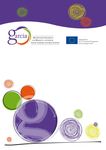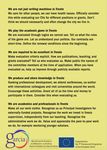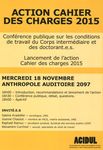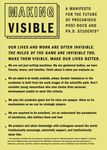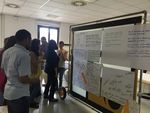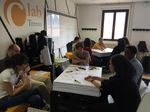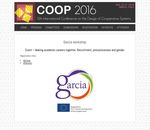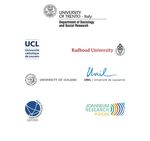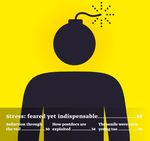18 Workshops for early career researchers: 12 SSH and STEM test institutions - GARCIA WORKING PAPERS - GARCIA Project
←
→
Page content transcription
If your browser does not render page correctly, please read the page content below
GARCIA WORKING PAPERS 18
Workshops for early career
researchers: 12 SSH and STEM
test institutions
Edited by Marjolein Dennissen, Channah Herschberg,
Yvonne Benschop, Marieke van den BrinkGARCIA is an EU-Framework 7 funded project under topic SiS.2013.2.1.1-1
“Supporting changes in the organisation of research institutions to
promote Gender Equality”
Grant agreement n. 611737 • Project coordinator:University of Trento •
Homepage: www.garciaproject.eu
The sole responsibility of this publication lies with the author. The European
Union is not responsible for any use that may be made of the information
contained therein.
!GARCIA – GA n. 611737 GARCIA WORKING PAPERS 18
Table of contents
General introduction 4
1. BELGIUM, by Grégoire Lits 5
1.1 Introduction 5
1.2 Set up of the task 6
1.2.1 SSH Department 6
1.2.2 STEM Department 10
1.3 Evaluation of the task 13
1.4 Conclusion 15
2. ICELAND, by Finnborg Salome Steinþórsdóttir, Gyða Margrét Pétursdóttir,
Þorgerður Einarsdóttir 16
2.1 Introduction 16
2.2 Set up of the task 16
2.2.1 STEM and SSH department 16
2.3 Evaluation of the task 18
2.3.1 STEM and SSH department 18
2.4 Conclusion 20
3. ITALY, by Francesca Fiore, Rossella Bozzon, Annalisa Murgia, Barbara Poggio 21
3.1 Introduction 21
3.2 Set up of the task 22
3.2.1 STEM department 23
3.2.2 SSH department 30
3.2.3 University level 34
3.3 Evaluation of the task 36
3.3.1 STEM department 36
3.3.2 SSH department 37
3.3.3 University level 38
3.4 Conclusion 39
3.5 References 39
4. The NETHERLANDS, by Laura Berger 41
4.1 Introduction 41
4.2 Set up of the task 42
4.2.1 SSH department 42
4.2.2 STEM department 43
4.3 Evaluation of the task 45
4.3.1 SSH department 45
4.3.2 STEM department 46
4.4 Conclusion 48
4.5 Appendices 49
2GARCIA – GA n. 611737 GARCIA WORKING PAPERS 18
5. SLOVENIA, by Polona Sitar 50
5.1 Introduction 50
5.2 Set up of the task 52
5.3 Evaluation of the task 56
5.4 Conclusion 58
6. SWITZERLAND, by Sabine Kradolfer 60
6.1 Introduction 60
6.1.1 Swiss context 60
6.1.2 Situation of postdocs 63
6.1.3 Existing workshops for postdocs 68
6.2 Set up of the task 69
6.3 Evaluation of the task 71
6.4 Conclusion 71
6.5 References 72
3GARCIA – GA n. 611737 GARCIA WORKING PAPERS 18
GENERAL INTRODUCTION
This GARCIA Working Paper ‘Workshops for early career researchers: 12 SSH and STEM
test institutions’ presents the collection of the reports on the workshops for early career
researchers that were organized in the six GARCIA beneficiaries: Belgium, Iceland, Italy,
the Netherlands, Slovenia, and Switzerland. The workshops were organized in two
disciplines: Science, Technology, Engineering and Mathematics (STEM) and Social
Sciences and Humanities (SSH).
The workshops for early career researchers are part of work package 7 of the GARCIA
project. The GARCIA Project – Gendering the Academy and Research: combating Career
Instability and Asymmetries – is concerned with the implementation of actions in
European universities and research centres to promote gender equality and to prevent
gender stereotypes and discriminations. Work package 7 focuses on the revealing of
gender practices in the construction of academic excellence in recruitment and selection
procedures. The construction of academic excellence is especially salient for the early
stages of a academic career, as the label of excellence can make the difference between
the inclusion or exclusion of researchers in academia. Building on GARCIA working paper
n. 2 on the gap between formal and actual criteria (Herschberg, Benschop, & Van den
Brink, 2015), and working paper n. 10 on gender practices in the construction of
excellence (Herschberg, Benschop, & Van den Brink, 2016), these workshops are
developed for prospective candidates in the early stages of their academic career in
order to inform them about the criteria for building an academic career.
The aims of the workshops with prospective candidates were threefold. First, to give
candidates information about recruitment and selection criteria applied in the selection
processes for early career researchers and how the formal criteria can differ from the
actual criteria applied when a candidate is selected. Second, to raise awareness about
the gendered construction of academic excellence and gender practices in recruitment
and selection processes. And third, to discuss with early career researchers how to take
the next step in building their academic career.
Workshops are thus designed to discuss the recruitment and selection criteria and
processes for early career researchers and how gender practices can play a role in these
processes. Each beneficiary reported on the organization, execution and evaluation of
these workshops in their national and organizational context. They reported on the
challenges and resistances that they encountered either during the organization of the
workshop or during the execution of the workshop. Although the basis of the workshops
was the same for every beneficiary, national and organizational context factors resulted
in several differences between the beneficiaries. For example, in some beneficiaries it
was not possible to carry out the workshops in the STEM and SSH department
separately. However, these differences resulted in a valuable overview of what the
organization of a workshop of this kind entails in different national and organizational
contexts. This exemplifies that keeping in mind the context in which the workshop is to
be organized is crucial for its effectiveness and success.
The collection of these reports will provide insight into the organization of workshops
for early career researchers, challenges, resistances, learning points and the main
outcomes of these workshops at six European universities and research centres.
4GARCIA – GA n. 611737 GARCIA WORKING PAPERS 18
1. BELGIUM
1.1 INTRODUCTION
The objective of organizing reflexive working groups with prospective candidates is to
give them some information about the current situation of recruitment in academia to
help them to become aware of how recruitment selection processes work. We use two
different settings to achieve this goal. We first organised two reflexive workshops, one in
the STEM department (ELI) and one in the SSH department (IACCHOS). These workshops
gathered a small amount of participants (3/4) that 1/ exchanged their experiences of
recruitment as postdoc researcher or PhD student, and 2/ were given information
coming from previous Garcia research conducted in UCLouvain about selection
procedures.
A second setting was developed only in IACCHOS. We organised a presentation of some
results of the Garcia project at destination of all young researchers of IACCHOS that
attended a day of formation for young researcher organised by IACCHOS. This
presentation reached between 30 and 40 young IACCHOS researchers.
UCL specific context of recruitment
Selection procedures at the postdoctoral level at UCLouvain can take different forms.
Tenure-track recruitment procedures are particularly different from non-permanent
postdoctoral research or teaching staff member recruitments. Tenure-track
recruitments (at the level of “chargé de cours” (assistant or associate professor) or
“chercheur qualifié” (research associate) are the most formal recruitment procedures. It
is the only stage of the career for which an official recruitment committee is constituted
to assess the scientific quality of the candidates. Non-permanent post-doctoral position
generally does not imply the constitution of a selection commission and are often
directly conducted by the primary investigator of a research project himself.
Tenure-track recruitment procedures also depend on the scientific career paths that
exist. Two career paths exist in Belgian universities: appointment as permanent
professor at a university and appointment as permanent research associate at the FNRS
(Belgian Funds for Scientific Research). Selection procedures as university professor or as
permanent researcher at the FNRS are different.
This recruitment procedure is very formalised and similar in every institute of the
UCLouvain. When a position opens, a job advertisement constituted of a precise profile
description is widely distributed. In the same time, a local (i.e. within the Faculty where
the position is located regarding teaching duties) recruitment committee is constituted.
This committee typically gathers 3 or 4 full professors from the Faculty and 2 external
members generally coming from abroad. This tailor-made committee examines all the
applications received and draws up a short-list with candidates that will be invited to a
hearing. After the hearing, the committee produce a ranking of the candidates. This
ranking (identifying generally one preferred candidate, in some cases two can be ranked
as first) is transmitted to the central authority of the UCLouvain (the rectoral board,
composed of the rector and vice-rectors). The rectoral board then invite the first-ranked
candidate(s) for a hearing and makes the final decision to appoint the candidate selected
5GARCIA – GA n. 611737 GARCIA WORKING PAPERS 18
by the local recruitment committee. Generally the candidate selected by the local
commission is appointed, but, in some uncommon cases, the rectoral board can decide
that the first-ranked candidate does not demonstrate sufficient scientific achievement
and decide to close up the procedure and postpone the appointment to the next year.
1.2 SET UP OF THE TASK
1.2.1 SSH Department
Organization of the workshop
We launched a first round of invitations to PhD students, post-doctoral researchers or
former PhD students (who graduated in the three last years) from IACCHOS. We
contacted 15 people. 6 agreed to take part to the meeting, 5 were not available at the
different dates proposed, 2 refused to participate (one because of a too heavy workload
at this period, another didn’t wanted to address these topics with colleagues but gives
us the contact information of his girlfriend who also is a PhD student in IACCHOS and
was interested), two did not responded to our invitation. Finally on the 6 who agreed to
take part, two didn’t attended the meeting. One because of a too heavy workload, the
second was ill that day.
In this invitation we presented the Garcia project and explained that the aim of the
workshop was to discuss the following issues: 1/ How to get a permanent academic job
today? 2/ What are the different ways in engaging with work in research institutions? 3/
We wanted to discuss the difficulties and obstacles that participants to the meeting face
in their career. 4/ We wanted to discuss the perceptions of research work environments
that the participants have.
The workshop took place on March the 30th 2016.
The four participants have different profiles, they come from three disciplines: economy,
sociology and history:
Participant 1, is a male former PhD student in his mid-thirties. He obtained his
PhD in 2013 from UCLouvain. He is at the time of the meeting (and has been
doing that since the end of his PhD) lecturer (pay per hour) in different
institutions of Higher education (community colleges), director of a public
observatory (50% employment contract) and free-lance researcher. He is
currently looking for employment as assistant professor in a university. He has
one child.
Participant 2 is a female post-doctoral researcher in his early-thirties. She
obtained her PhD in 2012 in UCLouvain. Since then she obtained postdoctoral
grants in two different universities (one abroad, and one in Belgium). She is
currently invited (pay per hour) lecturer in UCLouvain and in France and
consultant (pay per hour) for a prestigious university in the UK. She is in couple
with a researcher also working abroad and she is childless.
Participant 3 is a male (in his mid-twenties) PhD student in the last year of his 4
years grant from the FNRS (fundamental research). He is in couple, childless.
6GARCIA – GA n. 611737 GARCIA WORKING PAPERS 18
Participant 4 is a male PhD student (in his mid-twenties), in the second year of
his 4 year grant. He has a grant from a public organisation aiming at producing
applied research that benefit the development of one of the Belgian regions.
He is in couple, childless.
On the 15 invitations we launched, 10 were send to women. Rate of acceptance for
women is 10%, while this rate is 60% for men. Even if we are not in a quantitative
research settings, this difference in acceptance rate is worth noting.
Content of the discussions
We organized the discussion in three distinctive rounds. In the first one, we asked the
participants to present themselves and to talk freely about the topic of this meeting
(making an academic career). In the second one, we presented result from previous
Garcia investigation about four “relationships to the scientific career” that are four ideal-
typical modalities of engaging with academic work. Based on interviews made with
postdoc researchers in Louvain, we identified 4 types of engagement: “full engagement
with work”, “optimistic engagement”, “ambivalent engagement”, and “distant
engagement”. In the last round of discussion, we presented the results of another
research about the conception of “academic excellence” realised at UCLouvain. Based
on interviews made previously with recruitment committee members, we distinguished
two different conceptions of what is scientific excellence at UCL. A first one we called
the “nomination set of criteria” and a second that we called the “competition set of
criteria”. We then asked the participants to comment and discuss this distinction. We
asked them if they agreed with this analytical distinction between these two set of
criteria that are used to evaluate the scientific quality of a candidate during recruitment
procedures.
The first round of discussion was thus devoted to a presentation of the participant and a
free discussion about what does it means to work in a university. The less that we can
say is that the first two speakers (the two postdoctoral researchers) presented a very
negative picture of their working conditions. They highlighted the high pressure they
have to face, the numerous sacrifices they have made, and a strong pessimist view on
their future possibilities in academia.
The opening speaker began by telling us a strong disappointment he had lived one week
before the meeting. He applied for a position as assistant professor in a university, he
went through the selection process and achieved to be ranked first by the recruitment
committee. His profile was thus send to the central administration of the university
where the final examination is done by the rectoral board. The rectoral board decided
not to hire the candidate and to leave the position open for one more year. His profile
was judged not excellent enough. This is below, how he explained this episode and how
he linked it to what excellence is:
“As I understood it [this episode], excellence is very important, we have to be
international, and I could say that this university want more to be excellent
and to be in concurrence with Oxford, Harvard, MIT or I don’t know what,
that looking at the fact that she is anchored in a territory with an history. I
have enormous frustration now. (…) for the rectoral board, all that I have
done, that is outside the university, is zero. It is not a peer-reviewed article. I
7GARCIA – GA n. 611737 GARCIA WORKING PAPERS 18
heard that I had not enough publications, but I have 7 articles in peer-
reviewed journals plus 15 more in other journals or books. What I think about
excellence? I’m sick of this excellence. [j’en ai ma claque de l’excellence].
What I see around me, there is a gender effect, but there is also an effect of
this excellence seen as a unique pipeline. When you go through it, it crushes
people. And I have often thought that the best [researchers] goes out. When I
talk to postdocs, there is a lot of people who tell me: ‘I do not want to do this
anymore, to publish, to apply, to find a postdoc. Give me anything that I can
settle somewhere’. The game has become too much unidimensional” (Part. 1)
Directly after this first talk, the second postdoc researcher took the floor and went in the
same direction:
“This resonate a lot with my own experience. It does not feel difficult to be a
women, this is not the first difficulty. It is very difficult to make its own place.
I have known several disappointments. The argument of excellence, reduced
to the dimension of publications has been used against me, but I think that
this is an argument that is instrumentalised to justify other criteria that are
more ideological. My work is perceived (and I have now a precise
confirmation of that) as too much subversive or too much out of the box. (…)
There is a lot of arguments based on the idea that excellence is assessed only
through peer-reviewed publications, in which I finally engage myself (I have
now four publications in major international journals), but now I do not want
to apply to FNRS grants anymore. On another hand, teaching experiences and
experiences outside university is totally downgraded. I have a huge
experience of teaching, with excellent evaluations and this is not valorised at
all. I’m disillusioned. I’m considering quitting research despite the fact that I
love my job, and that my research topics are, I think, very important for the
society. (…) I’m discouraged, and it takes a lot to discourage me, but I have
enough to be oblige again and again to prove that what I make makes sense
and is important.” (Part. 2)
The two PhD students reacted to these two first statements:
“Something that strikes me [after three year as a PhD student] is the
insecurity [précarité] of the job. Not regarding salaries or financial aspects,
but regarding the efforts that are expected of us compared to the prospects
that we can have. There is a gap there. There is maybe to many PhD students.
The insecurity, people are asked to spend one year there, one other year
there, international is compulsory. It looks like researcher are disembodied
person, out of a context: ‘go abroad for a year, it’s not difficult!’ as if
researchers are unattached. (…) It is expected that researchers can contempt
themselves with six months of contract there and then some more months
there. It is striking and not pleasant. (…) I’m not against going abroad, it is
certainly very rewarding, but regarding the work perspective that we can
have after all these efforts, if it is to be back to zero, which happens often, it
is a bit harsh.” (Part. 3)
“It is different for me as I’m not yet in a position where I will do career
choices, will I achieve it or not? But I heard that funding are rather short. I’m
8GARCIA – GA n. 611737 GARCIA WORKING PAPERS 18
funded by this administrative agency (…) They are not interested that I
publish peer-reviewed articles, they are not interested that I engage in my
university, they want that I produce something that they can use for their
politics. But I do a PhD, and it could bring me to the postdoc job market, but
if I neglect this, I neither will be competent for the academic job market, nor
for the job market outside academia. I try to be active on the two sides, not
knowing where I go. I find it quite dangerous to say: ‘I want to make an
academic career’, because it seems very uncertain. Not knowing where I go, I
try to make the two at the same time. It is a lot of work, and I even not sure
that it could take the form of excellence in neither situation. (…) I have the
impression to be paid by the administrative agency because it is cheaper for
them to paid a PhD student that a real employee. I’m financed as a PhD
student but they do not really want me to do a PhD.” (Part. 4)
In the two last rounds of discussion, around the presentation of some results obtained in
previous investigation conducted in UCLouvain for the Garcia project, the participants
talked mainly about how they perceive what working in a university means. A first
consensus emerged between the participants regarding the strong evolution that
universities have known recently and the unpreparedness, or inexistence of support, vis-
à-vis these transformations coming from senior professors.
“My PhD director belong to the old system. She was not at all aware of the
‘bibliometric imperative’. I was very naïve and very young. I have made my
thesis, because I loved my subject, but I have never thought strategically
about my PhD. I heard that you used the expression [referring to what
another participant said] ‘to build my CV’, I have never done that. (…) My
director transmit me very good values, but she said to me: ‘I feel sorry that I
never prepare you to make a career in the current system”. (Part. 2)
“My PhD director is very young, he has gone through all that and he is not
anachronistic as older professors could be. (…) At the level of my research
centre the question of career is inexistent. We have a seminar where the
young researchers of the centre talk about methodologies or concrete
problems we could face. Senior professors comes by sometimes and when
we address the question of research projects evaluation or other stuff, they
seems even more lost that some PhD students. They do not know how to rise
the chances to get grants. (…) I do not have the impression to receive advice
on how to act strategically.” (Part. 4)
“I think that in some senior professor there is a moral posture [against
excellence] but that goes along with a lack of understanding. They are
settled, and they do not understand what does not work now.” (Part. 4)
They also criticized the “academic system” as it is perceived and have made some
recommendations:
“The system is not made to select the best it is made to select those who are
the most ready to make sacrifices: family, a worthy life, to have other
activities than work.” (Part 1)
9GARCIA – GA n. 611737 GARCIA WORKING PAPERS 18
“There is not really a graduate school for PhD students, I find that strange,
and it shows a certain vision of the importance of PhD students” (Part. 4)
“We have no intellectual formation, no real intellectual formation during the
PhD, (…) We have to gain 60 credits, we have three days of formations every
year on history, art and archaeology, (…) but they go from Greek pottery to
medieval painting, this is interesting but this is not an intellectual formation.”
(Part. 3).
Organization of the conference (April the 13th, 2016)
The 13 of April 2016, the IACCHOS institute organised his first “workshop for young
researcher”. This event was the first manifestation of a new interest in IACCHOS for the
difficulties that young researchers can face. This topic of concern was raised at the
IACCHOS board of director since several years by the representatives of the non-
permanent researchers in the board. Last year this lead to the designation of a vice-
president of IACCHOS responsible of organising activities for young researchers of the
institute.
This one day long workshop was the first event organised by this “young researcher
appointee”. Several topical sessions were organised. In the morning the topic was: How
to valorise his research, through publication and in other ways? In the afternoon, the
topic was: “how to build an ‘attracting’ CV on the postdoctoral job market?”
We asked the organiser if we could integrate a presentation of some result of the Garcia
project in this workshop, which she agreed. We were offered a 45 minute presentation
at the end of that day.
During our presentation (attended by approximately 30-40 PhD students and
researchers) we presented 20 PowerPoints slides presenting the main results of
investigation conducted at UCLouvain about the leaky pipeline phenomenon, gender
asymmetries in UCLouvain, the different ways of engaging in academic work we
identified, and the different criteria that are used in recruitment committee at
UCLouvain.
1.2.2 STEM Department
Organization of the workshop
It was more difficult to gather young researchers from ELI than it was the case for
IACCHOS. We launched a first round of invitations using the official mailing list of the
institute. This invitation was thus sent to all non-permanent researchers (phD students,
postdoc, research assistants…) of ELI. We do not know precisely the number of non-
permanent researchers of ELI but the invitation reach between 100 and 150 researchers.
Only 3 researchers answered this first invitation and have shown an interest in the
project. We thus tried to contact several researchers directly through an individual
email. We contacted approximately 40 researchers of ELI directly, 1 answered us that he
was interested. One of these researcher then convinced two of his colleagues that
participation at our workshop would be interesting.
10GARCIA – GA n. 611737 GARCIA WORKING PAPERS 18
It was not possible to find a date that arranged all the 7 researchers interested, we
finally achieved to gather 3 researchers on the 6th of June.
The three participants have different profiles, they come from two disciplines: physics
and ecology:
Participant 1 is a female postdoc researcher. She is in her early-thirties. She got
her PhD in the Nederland in 2011. She then got several post-doctoral grants in
France and in the US and is now postdoctoral researcher at the FNRS in
UCLouvain. She is in couple with one child.
Participant 2 is a male postdoctoral researcher in physics and climatology in his
late twenties. He got is PhD from UCLouvain in 2015.
Participant 3 is a male postdoctoral researcher in physics and climatology in his
early thirties. He got is PhD from UCLouvain in 2014 and previously studied in
France.
Content of the discussions
As it was the case in IACCHOS, we organized the discussion in three distinctive rounds. In
the first one, we asked the participants to present themselves and to talk about the
topic of this meeting (making an academic career), but, and it was not the case in the
IACCHOS workshop, we firstly presented some insight from the Garcia project about the
leaky pipeline phenomenon and the concept of “greedy institution”. In the second one,
we presented result from previous Garcia investigation about four “relationships to the
scientific career” that are four ideal-typical modalities of engaging with academic work.
Based on interviews made with postdoc researchers in Louvain, we identified 4 types of
engagement: “full engagement with work”, “optimistic engagement”, “ambivalent
engagement”, and “distant engagement”. In the last round of discussion, we presented
the results of another research about the conception of “academic excellence” realised
at UCLouvain. Based on interviews made previously with recruitment committee
members, we distinguished two different conceptions of what is scientific excellence at
UCL. A first one we called the “nomination set of criteria” and a second that we called
the “competition set of criteria”. We then asked the participants to comment and
discuss this distinction. We asked them if they agreed with this analytical distinction
between these two set of criteria that are used to evaluate the scientific quality of a
candidate during recruitment procedures.
We will not make a compressive account of the content of the discussion. But it is
interesting here to emphasis the way in which these three postdocs explained how they
feel about their current position. In this regard, the third participant (first speaker)
totally agreed with the presentation we made about university being greedy institution.
He explained us why he decided to stop research in short term. The second participant is
sitting on the fence, and the third one also consider quitting quickly if she do not find a
permanent position soon.
At the same time they all agreed to say that they love science, and that they would be
really happy if they were granted a permanent position today. The following excerpts
from the recording of the workshop give a more detailed description of the views of the
participant on looking for a permanent position, or quitting academia:
11GARCIA – GA n. 611737 GARCIA WORKING PAPERS 18
“This productivity system [in universities] is constantly in contradiction which
what is excellence. Unless you are a genius, and it is not everyone, this
productive system makes that we degrade the quality of the science we
produce. With my PhD, I published 5 papers. If I had kept the most important
part to makes only one, it would have been very good. But we are constantly
pushed to publish quickly, thus we publish things we are not satisfied with. It
is a negative circle, if you are not satisfied with what you do, you loos
motivation. Finally I realize that this is still like that after the PhD. I’m in
postdoc. It was a test for me to know if it was going to have more appeal to
me that the PhD. And the answer is no. (…) for me excellence cannot be
achieved or, you are a genius and you can do everything, but I do not think
that that is 80% of the researchers. This is the reason why I do not want to go
on with research. My ambition, is to work for a living and not to live for my
work. (…) today, I’m almost disgusted by research. I even decided to not
apply for a position as assistant professor, even if I love teaching, (…) and I
know I had my chances for that position.” (Part. 3)
The second presented his own view.
“When I was PhD student, there was the graduation that was an incentive to
do what I had to do, now, as postdoc, I confess that I’m less motivated to
come to work on week-end, because I know that my contract end in two
years and It will be up to me to “beg”, and it is a strong word, for other
funding to be able to continue. Normally if I do good work I could expect to
be promoted, at least I think this is the case in the private sector, here every
time, the fact to be good, only allows me to scrounge for funding.” (Part. 2)
The last one presented her experience:
“What I think is the main hurdle for me to continue in science now. Actually
there are several. Obviously the publication of course that I think is
enormous. Even if you have publication in international journal, then the next
question of the committee will be: ‘well, what is going to be your next
publication?’ (…) They are not looking at what you have done, they are just
looking at the impact factor and that’s it. For me it seems that way. And then,
to get a permanent position, I think in Belgium. But also in the Nederland, not
in France actually, the teaching is also very important. (…) it’s difficult
because when you do a postdoc you’re supposed to do research, you’re not
supposed to do teaching, but then when you are evaluated for a job they say:
‘yeah, but you do not have any teaching experience’. (…) Basically you need to
be able to do everything and it is simply not possible to do everything. I think
when I was a PhD student I spent two years coming every week-end to the
labs to do my experiments, we did really great things, and I was so happy
doing that. And still, I don’t mind sometimes coming the week-end, but now I
have a baby, so I’m not going to spend all my week-ends going to the lab. It
just not the same anymore.” (Part. 1)
“I applied to a lot of permanent positions. Like 20 applications in two years’
time. I got invited to a couple of interviews, which was very nice. (…) And
then last year, I was in … and obviously I met all my competitors, you are all
12GARCIA – GA n. 611737 GARCIA WORKING PAPERS 18
there on the same day to make your presentation. They had invited three
younger researchers including me and two women, they are very for equal
opportunity in the UK, (…) I think that the person who got the job, she had 7
years more experience than me, of course she had postdocs and PhD’s so you
think: how is it even comparable? Competing with people it seems so
unrealistic.” (Part 1).
In the three case, the future is seen as very uncertain. The pressure on publication is
perceived as enormous by these three postdocs, and this pressure is not seen as healthy
nor for the individual life of the researcher (it pushes people to consider quitting
science) or for the general functioning of science.
1.3 EVALUATION OF THE TASK
When performing the two workshops and the conference, our main objective was to
create a learning environment by raising the awareness on evaluation criteria that are
used in recruitment procedure. We decided to organise reflexive workshop where a lot
of room was given to discussion between the participants and where they can share
their experiences and perceptions of recruitment procedures.
We will now evaluate the two workshops with this objective in mind. We will identify 1/
what have worked when performing the working groups, 2/ what challenges and
resistances we encountered, 3/ what learning points we gain from planning the
working groups and 4/ The specificity of the UCLouvain context and what future action
could be undertaken.
What worked when performing the working groups?
The way we structured the discussions, with three rounds of discussion around the
presentation of previous research results of the Garcia project was very effective. It
sparked fruitful discussions in both working groups (ELI and IACCHOS), and permitted to
clearly to trigger exchanges of perception between the participants.
The format of the working groups: 4 participants, 2 hours, 3 members of the Garcia
project to lead the discussions was plainly effective. The experiences conducted show
that, as it was the case for the workshop we organized with committee members, 3 or 4
participants could be an efficient amount of participants for a two hours working
groups. Every participant could talk approximatively 20 minutes and a sufficient amount
of time was still available for a debate between participants. More crowded working
groups would certainly have given less time for collective discussion.
We used two strategies to contact potential participants. In ELI we first tried to use
collective mailing list as a way to reach young researchers of ELI. This does not worked.
We then decided to contact researchers personally which was more efficient. We
actually were surprised by the actual response rate to the first wave of invitations in ELI
(4 answers out of more than one hundred invitations). It was much more complicated
to gather young researchers for a workshop than gathering senior professor from ELI. In
IACCHOS, as we are much more involved in this institute, it was much easier to target
13GARCIA – GA n. 611737 GARCIA WORKING PAPERS 18
directly people that would be interested in the workshop. We only send 15 invitations
and got 13 answers. This is due to our proximity with this institute.
What challenges and resistances we encountered?
The most difficult challenge was to find a date for the workshop. Postdoctoral
researcher have to face important workload and have to prioritize their activities. It
seems, that for some of them, (and certainly a lot of them in ELI) participate to a
workshop that is not directly linked to their research is not a priority. Moreover some of
the researchers interested were abroad during the period.
Another difficulties is the language used to communicate information. In IACCHOS, the
main language in use is French. Researchers that do not have an excellent command of
the French language are very rare. It seems not to be the case in ELI. A possible
explanation to the very low rate of interest in ELI is maybe located in the fact that some
postdoctoral researchers do not speak French fluently and thus didn’t feel concerned by
this activity conducted mostly in French (however, in the Eli workshop, one of the
participant spoke in English and it was not a problem as all participants and Garcia
member were fluent in English).
Another challenge we faced lies in the fact that almost all the participants to our
workshops had very pessimistic views on their future. Uncertainties are very high and it
was thus difficult to address the question of good practices or of example of
achievement in finding a permanent position. For our participants, it almost seems
impossible to find one. The discussion were dominated by emotion like frustration,
disillusionment, disappointment, and even “disgust”. We can fear that these two
workshops have reinforced these feelings amongst participants seeing that other
postdoctoral researchers have made the same experience and share the same negative
perceptions.
What learning points we gain from performing the working groups?
Through the discussions, we gained strong and valuable insight on how postdoctoral
researchers perceive their future. This is very interesting for our analytical objective, to
see that the analysis of university as greedy institution, and on the evolution of
universities toward new work rationalities were very in line with the way postdoc
researchers and PhD students perceive there situation.
Through these workshop we could see that organizational transformation of
universities have strong negative impact on the subjective life of young researchers.
The main topics of concern were 1/the notions of uncertainties and 2/the pressure to
productivity that seems somehow incompatible with those prevailing uncertainties. In
the view of some researchers, pressure to productivity, if goal are achieved, should be
linked to possible rewards or promotions, but in the current academic system, even if
you succeed to be very productive (that is mainly publish a lot in ‘good’ journals), you
are never sure to be rewarded, you can only “beg” or “scrounge” for small amount of
money for doing your job.
14GARCIA – GA n. 611737 GARCIA WORKING PAPERS 18
What was specific for our context, which future working group leaders need to take into
account?
We think that, beside the question of language used, the context of postdoctoral and
PhD student in UCLouvain is not particular different of the context encountered in
other institutions or in other European countries. This workshop setting could be easily
duplicated in other context as a way to enhance the sharing of experience between
young researchers.
1.4 CONCLUSION
The situation in ELI and in IACCHOS was to some aspect very similar. The young
researchers we encountered faced strong uncertainties. Most of them think that they
will leave science on a short term period, some feel strongly disappointed or even
“disgusted” by the system they are in.
The researchers of both institute criticize strongly what is conceived as “excellence” in
academia. Most agreed to say that the unidimensional view that excellence can be
assessed through publication is not a good thing. In both institutes, researchers
presented their experiences in recruitment procedures. And explained that for them,
strategies aiming at enhancing his/her own CV, like publication strategies that emphasis
the quantity of articles and not the quality of research, or the impact of a journal rather
than the content of a research is not positive, nor for them or for science. The
prevalence of this discourse on publication strategies even pushes some researchers to
leave academia.
In both workshops it was felt that recruitment procedure were unfair. That when a
candidate have strong research profile, selection committee ask them why they do not
have sufficient teaching experience and on the opposite when they are very strong in
teaching, it is perceived as non-important. Postdocs in our workshop have the
perception that they have to be “good in everything” and they feel (or they know) that
this is not possible, excepted maybe for “geniuses”. That led one of the participant to
say that: “he has not the good personality to be a researcher” (ELI, part. 2).
As these very critical stances on “excellence” were the main rationales that we
harvested from the researchers taking part to our workshops, it was very difficult to
gives them tricks and tips on how to enhance their CV or on how to fulfil what they
perceive as the “expectations” hanging over them. All the postdocs that have
participated to our workshop are very aware of these strategies. At some point, even
one young PhD student noted that, to his view he was more aware on the “new”
academic rules of the game that more senior professors of is research centre that show,
according to him, a “lack of understanding”.
15GARCIA – GA n. 611737 GARCIA WORKING PAPERS 18
2. ICELAND
2.1 INTRODUCTION
The main objective of the workshop was to create awareness among PhD students on
how to prepare for a career after completing a PhD degree and learn about the different
career areas open for PhD graduates. There were three goals for the training, firstly to
raise awareness that there are very few job openings within the University of Iceland
and open up the discussion on opportunities outside of academia. Secondly, to assist
PhD students who want to pursue an academic career to become aware of how the
evaluation and selection processes and practices at the University of Iceland and train
them to deal with those criteria. Thirdly, to guide PhD students in building flexible career
capital and to prepare applications for job openings outside of academia.
The GARCIA team conducted the workshop in cooperation with the School of Social
Science and the University of Iceland Student Counselling and Career Centre. The School
of Social Sciences offers a similar workshop for its PhD students, with the main focus on
skills that are useful for the progress of the students PhD programme. The workshops
have been held monthly for the past years; however the workshop has not been running
in the year 2015-2016 due to low attendance. To our best knowledge no similar
workshops exist in the School of Engineering and Natural Sciences. The University of
Iceland Student Counselling and Career Centre offers workshops on CV writing and on
preparing applications for job openings. However, these workshops have first and
foremost been aimed at students on bachelor and masters level. Hence, the Student
Counselling and Career Centre was quite happy with the cooperation, and saw it as an
opportunity to extend their services to the PhD students. The novelty of this workshop
was the focus on preparing the PhD students for a career after completing a PhD degree,
both within and outside of academia. This is a topic, especially the one regarding career
outside of academia, that is on top of the mind of many PhD students but seldom
discussed within the academic institution. In order to make the workshop sustainable it
was important to cooperate with the University of Iceland Student Counselling and
Career Centre, build on the existing knowledge, and make the workshop applicable to
the other academic schools at the University of Iceland. Hence, it was considered good
practice to design and conduct one workshop for the PhD students at the School of
Social Sciences and the PhD students at the School of Engineering and Natural Sciences,
which could be extended to other fields in the future. Furthermore, with the results of
task 7.1 and 7.2 being similar for the School of Social Sciences and the School of
Engineering and Natural Sciences it seemed fit for task 7.4.2 to bring together the PhD
students of both Schools. This however results in a shorter report from the Icelandic
GARCIA team.
2.2 SET UP OF THE TASK
2.2.1 STEM and SSH department: The School of Engineering and Natural Sciences and
the School of Social Sciences
All PhD students in the School of Engineering and Natural Sciences and the School of
Social Sciences were invited to participate in the workshop, originally advertised to be
conducted in Icelandic. An invitation was sent to 145 PhDs in the School of Engineering
16GARCIA – GA n. 611737 GARCIA WORKING PAPERS 18
and Natural Sciences and 94 PhDs in the School of Social Sciences on April 12 th 2016. An
reminder was sent on April 18th 2016 and information that the workshop would be
conducted in English, following a request from a PhD student in the School of
Engineering and Natural Sciences. In attempt to attract PhD students the workshop was
organised on a Friday afternoon, at 14:30 – 16:00, followed with a reception. In total 18
PhD students participated in the workshop, 15 from the School of Social Sciences and
three from the School of Engineering and Natural Sciences. Majority of the participants
were women (13 from SSH and 1 from STEM), but only four male PhD students attended
the workshop (two from SSH and two from STEM).
The workshop was set up as a seminar with four presentation. The first presentation was
on the outcomes of tasks 7.1. and 7.2, and the three following presentations were seen
as training for the PhD students on how to build a career within and outside of
academia. Questions and comments were taken after each presentation. However, few
questions and comments were received at the workshop but a lively informal discussion
took place in smaller groups in the reception afterwards. Lack of questions during the
workshop could be explained with the workshop being conducted in English, while the
informal conversation all took place in Icelandic.
Dr. Thamar M. Heijstra, an assistant professor working in the GARCIA project, presented
the research results on academic recruitments. The aim of her presentation was to
create awareness among PhD students on the criteria used in recruitment, selection and
evaluation processes and the practices at University of Iceland. Dr. Heijstra presented
the formal and the actual selection criteria in the selection process of assistant professor
positions and demonstrated actual practices in the School of Engineering and Natural
Sciences and the School of Social Sciences. In her presentation she raised awareness on
how evaluation criteria are not objectified truths, how evaluators’ conceptions of
‘quality’ differ, and how gender practices influence the selection process and the
selection criteria including conceptions of excellence. The PhD students did not ask
questions during the presentation, even though they were encouraged to do so.
However, they showed great interest in the results in the reception/social gathering
afterwards, especially the subjectivity of the criteria and the gendered aspects of the
selection processes. Furthermore, some students shared their gratitude on opening up
the discussion on few career opportunities within the University of Iceland an issue that
has up until now not been confronted within the academic institution.
Jónína Kárdal, from the University of Iceland’s Student Counselling and Career Centre
talked about transferable skills and professional reputation. Her presentation focused on
CV-writing and how to prepare applications for job openings outside of academia. Ms.
Kárdal encouraged the PhD candidates to identify their skills, map their strengths and
work towards building a flexible career capital and transferable skills. Furthermore, she
encouraged the PhD students to visit the Career Centre and use the services provided,
such as receiving a help from counsellors with writing CV’s, career portfolios and cover
letters. A PhD student opened up the discussion on the risks of being too self-gratulatory
in cover letters. This enabled an interesting conversation of the importance of self-
promotion and honesty. In the reception afterwards some PhD students shared how Ms.
Kárdal presentation was eye opening for opportunities outside of academia and a
positive inspiration.
17GARCIA – GA n. 611737 GARCIA WORKING PAPERS 18
Hulda Proppé is the Research Manager of the School of Social Sciences, her presentation
focused on research opportunities for PhD graduates who want to work within academia
and in research. The presentation was on the importance of producing and
disseminating excellent research, gathering teaching experience, understanding the
discipline, understanding the academic sector and understanding the labour market. Ms.
Proppé gave the PhD students tips on how to make an impact within their discipline, by
publishing, by aiming for quality not quantity, by having good references and start early
to think about collaborations and interdisciplinary cooperation. She encouraged PhD
student to set goals and mark out actions on how to achieve these goals. Furthermore,
Ms. Proppé gave information on national and international funding opportunities open
for PhD graduates and how to look for academic vacancies internationally. She stressed
the importance of PhD students extending their network and mentions that it is
essential for those who want an academic career, and shared tips and tricks on how a
PhD student can extend his/her network.
Dr. Ásta Bjarnadóttir, Chief Human Resources Officer at Landspítali the University
Hospital and PhD in Industrial and Organizational Psychology, gave a talk about post PhD
career options in the private sector from her own experience. Because PhD holders from
STEM, working outside of academia, are more visible than PhD holders from SSH it was
considered very important to have a presentation from a successful PhD holder from
SSH. In her inspirational talk Dr. Bjarnadóttir talked about the increasing opportunities
outside of academia, both nationally and internationally, and that PhD candidates are
very valuable assets for the labour market. She encouraged the PhD students to be
confident about their skills, make those skills transferable and to think outside the box,
and shared her experience of creating the jobs she has wanted. Dr. Bjarnadóttir received
questions in relation to her position as a Chief Human Resources Officers on the
evaluation of the criteria ‘social skills’. In her view that criteria is highly important, and
she stressed the importance of addressing it and being candid if a candidate has
encountered problems during his/hers PhD or career, such as a fallout with a supervisor.
2.3 EVALUATION OF THE TASK
2.3.1 STEM and SSH department: The School of Engineering and Natural Sciences and
the School of Social Sciences
When considering what worked when planning and performing the working groups
there were four main elements that made the task successful. First, it was important to
focus on careers inside and outside of academia. The results of task 7.1 and 7.2 show
that there are little chances for a full-time permanent position within the University of
Iceland for PhD graduates from University of Iceland, therefor it was important to create
awareness and prepare the PhD students to face this reality. Second, it was important to
collaborate with the University of Iceland’s Student Counselling and Career Centre. We
think it is important that a formal governing body within University of Iceland offers
these services to the PhD students, and the Career Centre was very interested in
reaching out to this group of student. We believe by building a platform between the
early career academics and the Career Centre, the early academics have a place to seek
guidance and support when building a career after the termination of their PhD
programme. Third, it was very important that a successful PhD holder, who has a career
18GARCIA – GA n. 611737 GARCIA WORKING PAPERS 18
outside of academia, did a presentation on tips and tricks concerning the labour market
outside of academia. We believe that Dr. Ásta Bjarnadóttir was an inspiration for the
early career academics and opened up possibilities that weren’t maybe visible for some
PhD Students before the meeting. Fourth, it was very positive to have Ms. Hulda Proppé
give insight into the national and international funding market and international career
opportunities for those early career academics that are aiming for a career within
academia. We believe her tips and tricks will guide prospective candidates on how to
make the most of their PhD programme and prepare them for the career that awaits
them after graduation.
The PhD candidates described in informal conversation in the reception after the
workshop that it was important to start a conversation about the low chances of a
position for UI PhD graduates within the University of Iceland. The candidates were,
however, very positive and saw the presentations as useful instruments on how to go on
with their PhD programme and to build their careers. Furthermore, the PhD candidates
were positive on the discussion on the gender practices and how excellence is
constructed in the selection process. Some PhD students shared how the outcomes of
task 7.1 and 7.2 fits their feelings about recent appointments within the University.
Others saw these results as useful tips on how to make the most of their PhD
programme and build a scientific career within the University of Iceland. This
information is however built on informal conversations the GARCIA group had with the
PhD students in the reception after the workshop. Future workshop leaders should get a
more formal feedback from the PhD candidates, that can be done with a short online
survey on the workshop.
Furthermore, we believe that it was a very positive to bring together the PhD students
from the School of Engineering and Natural Sciences and the School of Social Sciences.
The Schools are not only very similar in term of the construction of excellence in the
selection process, but we think it is good for PhD students in both Schools to see their
individual position in a bigger context. There is an idea an PhD programme in the School
of Social Sciences should be a lone working process and even a lifetime’s work, while the
PhD programme in the School of Engineering and Natural Sciences is seen as being more
pre-defined and based on co-operation, and therefor the programme can be finished in
a relatively short time. We believe that the workshop can take part in deconstructing
ideas about the School’s PhD programmes, and that the candidates can compare and
contrast with each others and have a realistic expectations about their programmes.
Some PhD candidates revealed their surprise on the matter in informal conversations
after the workshop.
The biggest challenge in planning and performing the workshop was to get the PhD
candidates to participate. In attempt to attract more participants, the workshop was
arranged on a Friday afternoon, followed with a reception. It did, however, not result in
good attendance. This reflects a reoccurring problem when it comes to PhD students, at
least within the School of Social Sciences, where there is generally very poor attendance
to meetings and the monthly workshop for the School’s PhD students. This has resulted
in the monthly workshop being cancelled during the winter of 2015-2016. Future
workshop leaders have to take this into account, and we believe that it is important to
reach the PhD candidates with a different method. Possibly through the PhD student
associations that are active in both schools. It is important to mention that when
19GARCIA – GA n. 611737 GARCIA WORKING PAPERS 18
preparing for this workshop we were in good contact with the student association at the
School of Social Sciences.
Another challenge, that might be considered a common problem in Icelandic society,
was to get the PhD students to take part in the conversation during the workshop.
Future workshop leaders have to take that into account, find ways to make the
workshop more interactive. A good example on this problem from the workshop was
when Dr. Proppé started her presentation she asked the PhD students to raise their
hand if they were considering a career in academia. The PhD students were very
hesitant and very few raised their hands. The hesitation could, however, be explained
with the PhD students being realistic or them being cautious about raising their own
expectations. The low chances of getting a position, especially within SSH, is highly
visible within the University of Iceland. The hesitation could furthermore be explained
with the workshop being conducted in English. Most PhD students have Icelandic as a
first language, and we have a feeling they are insecure with speaking up in English at
meetings and workshop such as this one.
2.4 CONCLUSION
We see the workshop as a feasible instrument for the University of Iceland to raise
awareness among the PhD students on their career opportunities after the termination
of their PhD programme. The workshop can serve as a practical instrument for the PhD
students on how to go on about their studies in relation to future aspirations, inside or
outside academia, after the completion of their PhD program. The PhD students that are
aiming for a career within academia are after a workshop like this one better prepared
for the evaluation and selection processes and practices, more aware on where to seek
opportunities after the completion of their PhD programme and able to aim at building a
successful career based on what is known to be considered ‘excellent’. The PhD student
that see more opportunities outside of academia will gain access to specialists and
instruments at the Career Centre and tips and trick on how to build a successful career.
We believe that future workshop should be conducted by the the University of Iceland’s
Student Counselling and Career Centre in co-operation with all the academic schools. A
workshop like this one should be conducted once a year and should be made mandatory
for first year PhD students.
20You can also read
